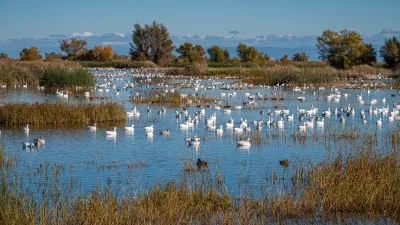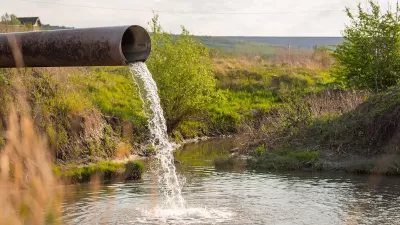Matt Pearce reports on the town of Marshall's road to recovery after a 2010 oil spill damaged the area's human and natural ecosystems, and describes how these long-term impacts should serve as a warning to other communities.
The Kalamazoo River in Michigan was reopened at the end of June after a massive 2-year clean-up of the oil spill that occurred during the summer of 2010, affecting both the river and the Talmadge Creek. A moratorium of a "do-not-eat" order for fish was also lifted, signaling what health officials hope to be a return to normalcy for the community.
While the Department of Health insists that the water is now safe, others are still wary. Rita Chapman, who deals with clean-water issues for the Sierra Club's Michigan chapter, warns, "They say that only 40 miles of the river was affected, but do we know that? The Kalamazoo flows roughly 80 miles to Lake Michigan, and Lake Michigan provides drinking water for millions of people."
Adding insult to injury is the realization of the increasing "corporate and regulatory failures" which make these kinds of spills possible. Writes Pearce, "Government investigators concluded that the pipeline's Canadian owner, Enbridge Inc., knew about the crack that led to the spill five years before the accident. They also found that when the break did occur, employees mistakenly continued to pump oil into parts of southern Michigan."
Community members and visitors have begun making their way back to the water in time for summer, while others remain fearful of the long-term impacts of these types of spills. Says local resident Susan Connolly, "I hope other communities will learn how we've been impacted here in Michigan. There will be other spills. It's not a matter of if, but when."
FULL STORY: Two years after oil spill, town and its creek are reshaped

Planetizen Federal Action Tracker
A weekly monitor of how Trump’s orders and actions are impacting planners and planning in America.

Maui's Vacation Rental Debate Turns Ugly
Verbal attacks, misinformation campaigns and fistfights plague a high-stakes debate to convert thousands of vacation rentals into long-term housing.

Restaurant Patios Were a Pandemic Win — Why Were They so Hard to Keep?
Social distancing requirements and changes in travel patterns prompted cities to pilot new uses for street and sidewalk space. Then it got complicated.

In California Battle of Housing vs. Environment, Housing Just Won
A new state law significantly limits the power of CEQA, an environmental review law that served as a powerful tool for blocking new development.

Boulder Eliminates Parking Minimums Citywide
Officials estimate the cost of building a single underground parking space at up to $100,000.

Orange County, Florida Adopts Largest US “Sprawl Repair” Code
The ‘Orange Code’ seeks to rectify decades of sprawl-inducing, car-oriented development.
Urban Design for Planners 1: Software Tools
This six-course series explores essential urban design concepts using open source software and equips planners with the tools they need to participate fully in the urban design process.
Planning for Universal Design
Learn the tools for implementing Universal Design in planning regulations.
Heyer Gruel & Associates PA
JM Goldson LLC
Custer County Colorado
City of Camden Redevelopment Agency
City of Astoria
Transportation Research & Education Center (TREC) at Portland State University
Jefferson Parish Government
Camden Redevelopment Agency
City of Claremont




























